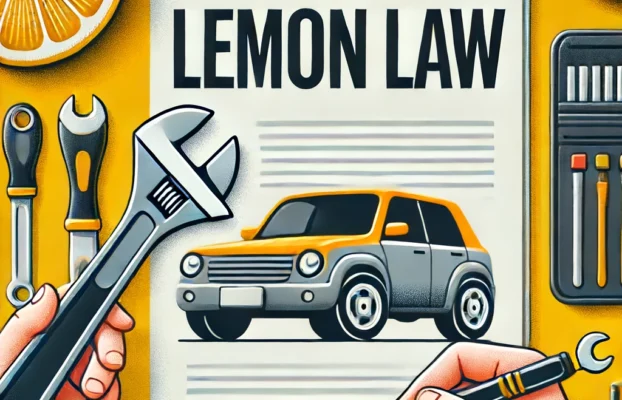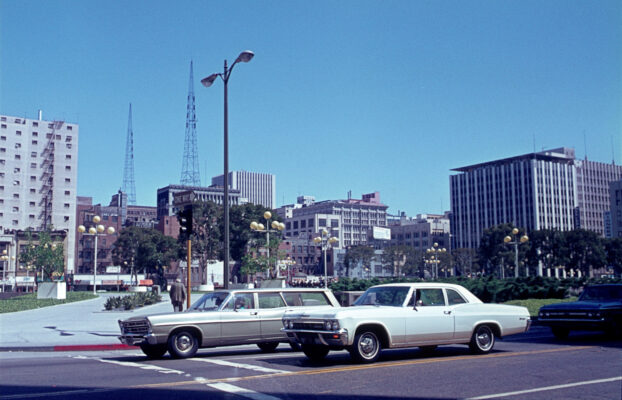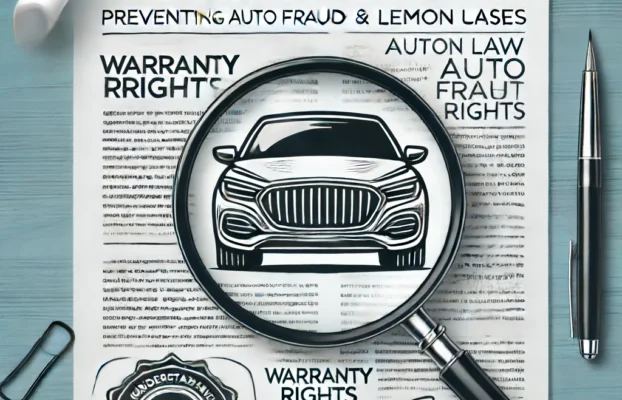What Does Audi Owe You For Your Lemon? 1. Down Payment refund 2. all monthly payments 3. rental and repair costs 4. full bank loan payoff 5. complete lease refund
You Pay Nothing Even if We Win Your Audi Lemon Law Case.
Is Your Audi Defective?
Did Your Audi Come With a Warranty?
Get Your Full Refund
Audi Vehicle Issues (2022–Present): A California Lemon Law Report
Table of Contents
Introduction
Audi is renowned for blending luxury with performance, but even these high-end cars have encountered significant problems in recent years. Since 2022, Audi models across the lineup have faced a variety of defects – from engine and transmission troubles to software glitches and electric vehicle battery faults. Audi drivers in California (including Fresno, Los Angeles, San Francisco, San Diego, and Sacramento) should be aware of these issues, as they may qualify for relief under California’s lemon law. In this report, we’ll break down the most common Audi defects and recalls from 2022 to today, discuss related safety recalls and lawsuits, and explain how an Audi lemon law attorney can help owners get justice. If you’re experiencing repeated problems with your Audi, this friendly guide will inform you of what’s going on and why contacting an Audi lemon law lawyer in California might be your next best step.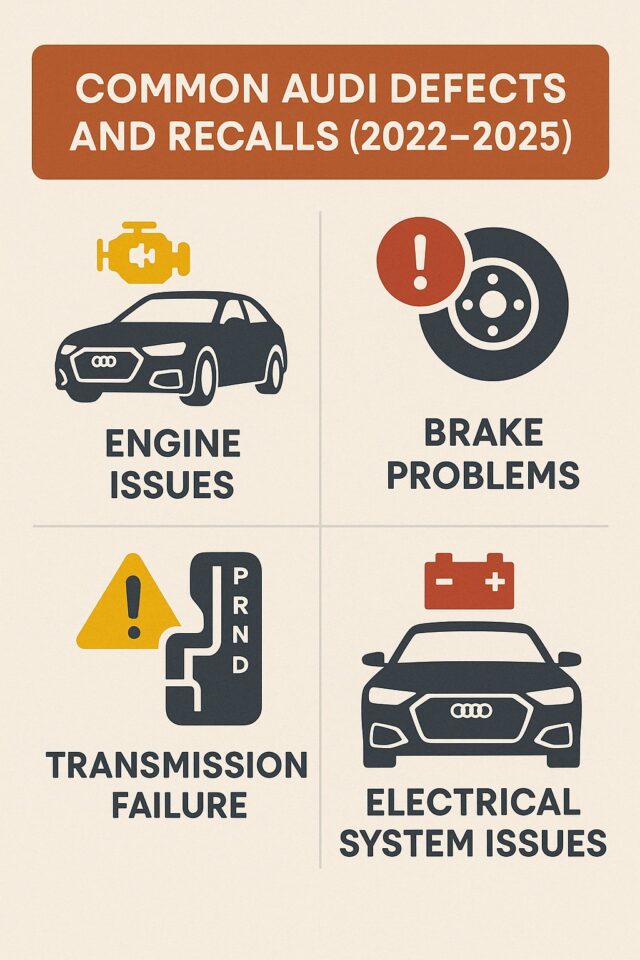
Common Audi Defects and Recalls (2022–2025)
Audi vehicles have exhibited issues in virtually every major system. Below, we outline the key problem areas affecting Audi models in recent years, along with examples of defects and official recalls. These problems are not isolated to one model – all Audi models (sedans, SUVs, sports cars, and EVs alike) have seen some of these defects nationwide. Audi and federal regulators have issued safety recalls and service bulletins acknowledging many of these recurring problems.
1. Engine & Powertrain Problems
Engine Stalling & Power Loss: One of the most serious issues has been sudden engine stalling. For example, 2021–2023 Audi Q5 and Q5 Sportback SUVs were recalled for an engine control unit (ECU) software defect that could cause the engine to shut off unexpectedly. Drivers reported their engines dying while driving, creating a safety hazard. Audi dealerships have been installing software updates to fix this stalling issue under the recall.
Excessive Oil Consumption: Some Audi engines are prone to burning oil at an abnormally high rate. This is a long-standing Audi problem that led to a class-action lawsuit covering certain 2012–2017 models. The lawsuit claimed defective pistons and rings caused engines to consume too much oil, risking engine damage. In 2024, Audi agreed to a settlement that extends the engine warranty and reimburses owners for repairs related to this oil consumption defect. While the affected model years in that case were older, the issue highlights Audi engine design problems that concern many owners. If your newer Audi is guzzling oil between service intervals, it shouldn’t be ignored.
Turbocharger Failures: Audi’s popular turbocharged engines (found in models like the A3, A4, A6, Q3, Q5, etc.) have also seen turbo failures. A recent 2025 settlement covered Audi and VW vehicles with certain EA888 turbo engines prone to premature turbocharger failure. The lawsuit alleged a design flaw in the turbo’s wastegate mechanism that could lead to failure, often just after the warranty expired. Affected owners (including some Audi A4, A5, A6, Q3, Q5 and TT models ranging roughly from 2008 up to 2023) are receiving extended warranties and partial reimbursements for turbo repairs under this settlement. Turbo failure can cause a significant loss of power or complete engine disablement, so Audi’s acknowledgment via this class action settlement is important for owners who experienced this problem.
Fuel System & Pump Issues: Several Audi models have been plagued by fuel pump defects. In mid-2022, Audi recalled about 50,000 SUVs (2019–2021 Audi Q8 and 2020–2021 Audi Q7) because an internal part in the fuel pump could break and cause the pump to fail. A failed fuel pump can lead to the engine stalling while driving, or prevent the car from starting at all. Dealers had to replace the defective fuel pump components to resolve the stalling risk. More recently, in 2024, Audi’s parent company announced a broader recall of over 260,000 Audi and VW vehicles for defective suction pumps in the gas tank that could cause fuel leaks. If fuel leaks from the tank, it poses a fire hazard. This recall primarily affected Audi A3 models (2015–2020) and similar VW models with a certain pump design. Owners were warned to watch for a gasoline smell or trouble refueling. These fuel system recalls show that both traditional gasoline engines and newer fuel system designs in Audis have had reliability issues.
Transmission & Drivetrain: While Audi’s transmissions (whether standard automatics or dual-clutch gearboxes) are generally advanced, there have been some concerns. A recall in late 2023 targeted the Audi Q4 e-tron (an electric SUV) because a software error in the parking gear display could fail to show when the vehicle was in neutral, contributing to a potential rollaway risk. Additionally, Audi has issued service campaigns to update transmission control software in some models to smooth out jerky shifting or prevent hesitation. Although no widespread modern Audi transmission recall has made headlines, individual reports of transmission failure, rough gear changes, or differential issues still occur. These problems can be especially frustrating because they often require expensive repairs or repeated dealer visits to diagnose. If your Audi’s transmission is repeatedly malfunctioning (for instance, slipping gears or harsh shifting), keep records of all repair attempts – it may strengthen a lemon law claim later.
2. Electrical & Software Glitches
Modern Audis are essentially “computers on wheels,” and unfortunately, various electronic gremlins have cropped up: 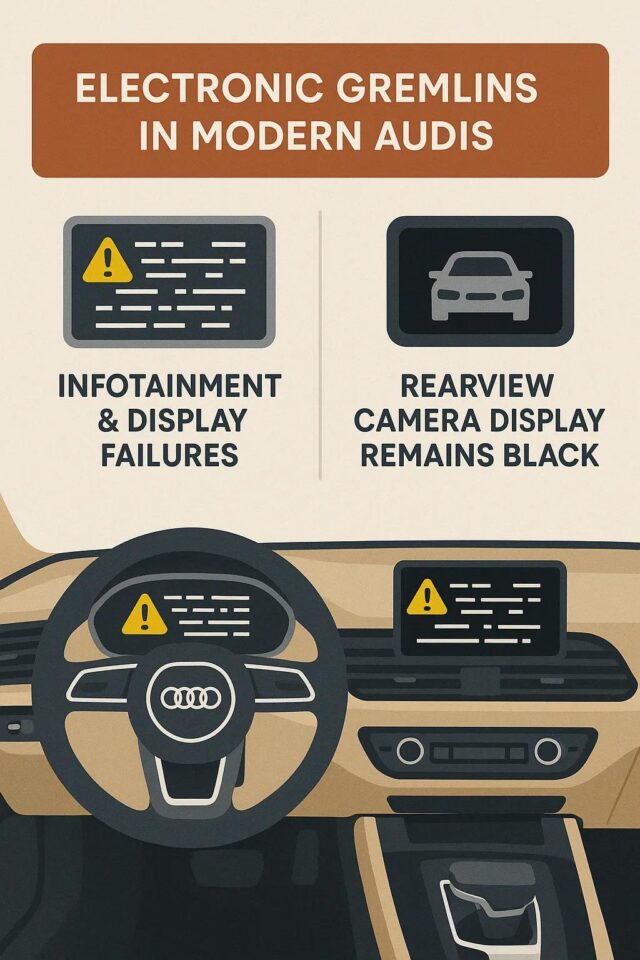
Infotainment & Display Failures: Audi’s Multi Media Interface (MMI) and digital instrument clusters have experienced glitches. A notable recall in 2022 involved nearly every new 2021–2022 Audi model due to a software bug that could cause the rearview camera display to remain black when the car is in reverse. Since a functioning backup camera is required for safety, Audi recalled models from the A4 sedan to the e-tron SUV to install a software update so that the camera image reliably displays. More recently, in early 2025, Audi recalled about 29,000 vehicles (including 2024–2025 Audi Q3 SUVs) for a similar rearview camera software error causing no image display. Beyond cameras, owners have reported infotainment screens freezing or rebooting, Bluetooth and Apple CarPlay connectivity issues, and navigation system bugs. Audi has released many software patches to address these. If your Audi’s screen frequently freezes or electronics misbehave, it’s not just you – these systems have been a common source of headaches.
Faulty Gateway Control Module (Electrical System): One major defect affected the electronic gateway control module – a central computer that manages communication between various vehicle systems (engine, airbags, etc.). In certain Audi models (e.g. 2018–2021 Audi Q5/SQ5, 2019–2022 A6/A7, and some 2021–2022 RS6/RS7), this module was placed under the rear seats in a location that was not properly sealed. As a result, if water spilled in the back or leaked in (say, from a rainstorm or car wash), the module could get wet and fail completely. Symptoms included a cascade of electrical problems – warning lights, loss of communication between systems, or the car not starting. Audi initiated a recall in late 2021 to install a protective cover and seal any body seam leaks to protect this module. Additionally, a class-action lawsuit was filed and later settled in 2023 over this design defect, with Audi agreeing to reimburse owners for related repairs. This issue taught many Audi owners the hard way that a simple water spill could disable their luxury car’s electronics. The fix is now well-known: dealers add a cover over the module and ensure no water can reach it.
General Software Gremlins: Audi has issued countless Technical Service Bulletins (TSBs) for software updates to address problems like false warning messages, malfunctioning sensors, and intermittent loss of various functions. For instance, some owners of 2022 Audi models reported “check engine” lights due solely to software calibration issues (no real engine problem). Others experienced their Audi Pre Sense collision alert system triggering for no reason (slamming the brakes or tightening seatbelts when nothing was ahead – a frightening false alarm). Whenever a pattern like this emerges, Audi often releases a software update or TSB. While these don’t always become official recalls, they indicate the ongoing electronic complexities. If your car spends more time getting computer resets than you spend driving it, that pattern of repairs could qualify your Audi as a lemon under the law.
3. Battery & Hybrid/Electric Vehicle Issues
Audi’s push into electric vehicles (EVs) and hybrids has been exciting, but it hasn’t been without problems: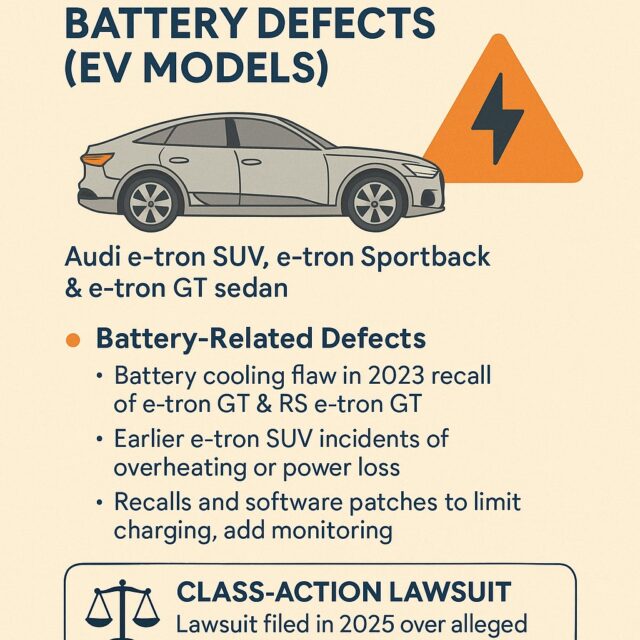
High-Voltage Battery Defects (EV Models): The Audi e-tron family (which includes the e-tron SUV, e-tron Sportback, and the high-performance e-tron GT sedan) has encountered battery-related defects. In 2023, Audi recalled a limited number of its flagship electric e-tron GT and RS e-tron GT (369 vehicles produced 2020–2022) due to a potential battery cooling system flaw that could lead to battery fires. Owners were advised not to charge their cars above 80% until a fix was in place. Similarly, the earlier e-tron SUV (2019–2022 models) had reported incidents of the high-voltage battery overheating or losing power. Audi issued a series of smaller recalls and software patches – essentially “piecemeal recalls” – in late 2023 and 2024 to mitigate an alleged battery defect that could cause sudden power loss or even fires in the e-tron SUVs. The interim fix often involved software that limits charging capacity to 80% and adds battery monitoring, pending a full repair. However, many critics say these measures didn’t address the root cause. In fact, a new class-action lawsuit filed in January 2025 alleges that Audi knowingly sold e-tron EVs with battery defects and that their recalls have been insufficient. The suit claims Audi knew of battery fire risks as far back as 2020 but “actively concealed” the issue. For owners of Audi EVs, it’s important to check for these recalls and heed any charging guidelines, as battery issues can be dangerous. On the bright side, Audi will replace battery modules or packs if diagnosed as faulty – and California’s lemon law covers EVs just like gas cars if persistent battery troubles occur.
Charging Equipment & 12-Volt Batteries: Even outside the high-voltage battery, Audi has had electrical woes. Audi recalled several e-tron SUV models for defective portable charging cables that could overheat and pose a fire hazard. Owners were instructed to get their charging units replaced or updated. Additionally, some Audi owners have faced chronic 12-volt battery drain issues – where the car’s regular battery dies overnight due to some electrical component not “going to sleep.” While not every battery drain results in a recall, dealers have addressed many via software updates or by replacing faulty control modules that draw power when they shouldn’t. So if your Audi repeatedly has a dead battery in the morning, it could be a known issue. Remember, if a dealership can’t permanently fix a battery drain after multiple attempts, you might be looking at a candidate for a lemon law claim.
Hybrid Systems: Audi’s plug-in hybrids (like the Audi Q5 e Quattro or A7 plug-in) combine engines and batteries, and thus can suffer both kinds of issues. There have been instances of hybrid Audis getting recalls for things like battery control module software errors or fuel system problems unique to how the hybrid system operates. Always stay on top of hybrid-related recall notices, as these systems are complex. The good news is that defects in hybrid components (battery packs, electric motors, etc.) are covered under warranty for an extended period – and California’s lemon law covers them as well if they malfunction repeatedly.
4. Safety Systems & Structural Issues
Audi prides itself on safety, but there have been notable safety-related defects: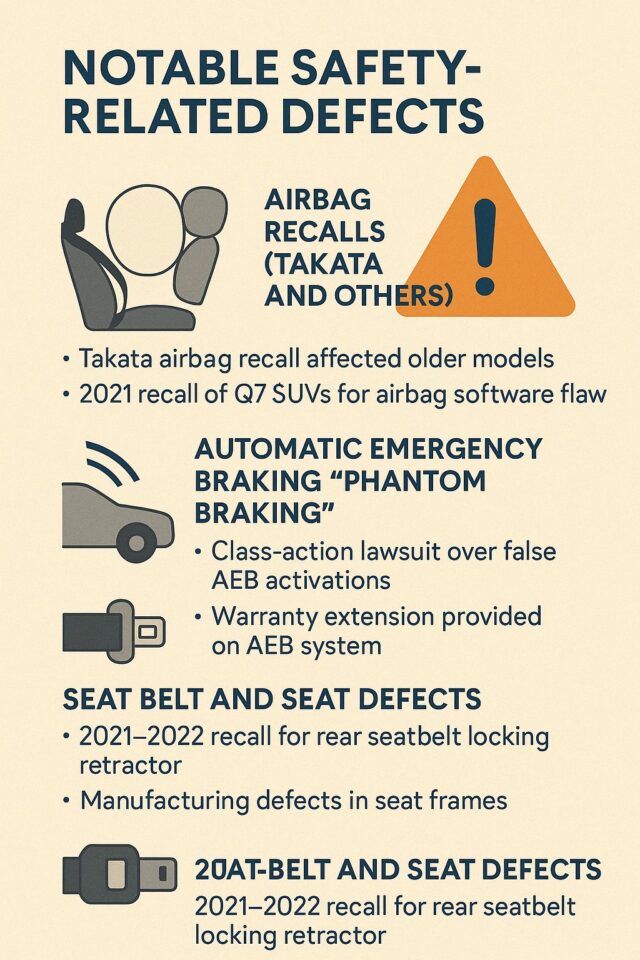
Airbag Recalls (Takata and Others): Audi, like most automakers, was impacted by the massive Takata airbag recall. Even in recent years, Audi has been contacting owners of older models to replace dangerous Takata front airbags that could explode upon deployment. Beyond Takata, Audi issued a recall in 2021 for some Audi Q7 SUVs because the airbag control module software could deploy the passenger airbag improperly when a child was in the seat, violating safety standards. Ensuring airbags deploy correctly is literally a life-and-death matter. If your Audi’s airbag light is on or you have any airbag-related recall, get it fixed immediately at a dealer. These repairs are free as part of recall obligations. (And if an airbag or seatbelt defect can’t be fixed after multiple tries, that is certainly something lemon law would cover due to the serious safety risk.)
Automatic Emergency Braking (AEB) “Phantom Braking”: Many newer Audis come with advanced driver aids like Automatic Emergency Braking (Audi calls parts of this system “Pre Sense” or “Front Assist”). A concerning issue arose where the AEB would trigger unnecessarily – the car would think there’s an obstacle and brake or stop suddenly when the road was actually clear. Owners across various Audi models (A3, A4, A5, Q5, Q7, Q8, e-tron, etc.) reported false AEB activations, leading to a class-action lawsuit. In late 2024, Audi and VW agreed to settle this lawsuit, covering dozens of models from 2013–2023 with AEB systems that might glitch. As part of the settlement, Audi did not recall the vehicles but provided an extended warranty on the AEB system (12 months/12,000 miles beyond the original warranty) and partial reimbursements for owners who paid for AEB-related repairs. If your Audi slams the brakes for no reason, it’s not only frightening – it increases the chance of a rear-end collision. Audi’s fix in many cases was to update sensor software or recalibrate the system. Make sure to report any such incidents; the warranty extension means you can get it addressed, and repeated failures could qualify as a substantial safety defect under lemon law.
Seat Belt and Seat Defects: Audi has also dealt with recalls for seat belt issues. In some 2021–2022 models, rear seatbelt locking retractors (which secure a child seat) were not working properly. That recall was to replace the seat belt assemblies so that child seats would be properly restrained. In other cases, Audi found manufacturing defects like improperly welded seat frames (for example, a 2020 recall for certain Q5/SQ5 seat backs). If a seat or seat belt fails in an accident because of a defect, injuries can be much worse. These structural recalls are less common but critical. Fortunately, when discovered, Audi has been proactive in fixing them. Always respond to seat or seatbelt recall notices promptly.
Body and Structural Problems: Generally Audi’s build quality is solid, but there have been a few quirks. Some Audi SQ5 Sportback SUVs were recalled in 2021 because the connections for the rear lid (hatch) were not properly attached at the factory, risking the rear hatch coming loose. Additionally, owners have reported water leaks from sunroofs or door seals in various models. Water leaks can lead to mold, electrical issues (as in the gateway module case), and general misery. Audi service departments often can fix leaks by replacing seals or adjusting panels. Another structural recall in 2021 involved many models for a rear axle lock nut that could crack from stress corrosion, affecting the stability of the rear suspension. In all these cases, Audi issued recall fixes at no cost to owners. While structural issues haven’t been as publicized as engine or electronics problems, they do happen and can affect your vehicle’s safety and value.
Summary of Recent Audi Recalls: Here’s a quick recap of some major Audi recall actions from 2022 to 2025:
Engine Stalling: 2021–23 Q5 & Q5 Sportback (ECU software update)
Fuel Pump Failure: 2019–21 Q7/Q8 SUVs (fuel pump replacement)
Rear Camera Blackout: Many 2021–22 models (MMI software update)
EV Battery Fire Risk: 2020–22 e-tron GT (battery monitoring software/limited charge)
Gateway Module Water Intrusion: 2018–21 Q5/SQ5, etc. (install cover, seal seams)
Takata Airbags: Various 2005–2015 models (replace front airbag inflators)
AEB/Front Assist: 2013–23 multiple models (extended warranty and software updates, via settlement)
This is not an exhaustive list, but it shows that Audi has had to recall vehicles for issues in the engine, fuel system, software, safety equipment, and more. No matter the defect, if it impacts your use, safety, or the value of the car, it’s a serious concern. Always check your mail or Audi’s website for recall notices by VIN, and get those free repairs. But what if the “repair” doesn’t permanently fix the problem? That’s where lemon law comes in.
Legal Actions and Audi’s Response to Defects
Audi’s recurring issues have caught the attention of consumer attorneys and courts. Several class-action lawsuits have been filed (and some settled) over Audi vehicle defects since 2022. These lawsuits often cover nationwide consumers and force Audi to extend warranties or reimburse owners – even if Audi hasn’t officially recalled the issue. Here are some high-profile legal actions:
Piston Ring/Oil Consumption Class Action: Covered earlier, this suit addressed excessive oil burning in 2.0L turbo engines of certain 2012–2017 Audi models. Status: Settled in 2024. Audi provided extended warranties (up to 8 years/80k+ miles) and reimbursements for engine repairs. While it involved older cars, it shows Audi’s accountability for engine design flaws when pressed legally.
Gateway Control Module Water Intrusion Class Action: This lawsuit (Gioffe vs. Audi) focused on the poorly placed gateway module in 2018–2022 Audis. Status: Settled in 2023. Audi agreed to reimburse owners for repair costs related to water-damaged modules and to extend warranties on that part. Notably, Audi had already done a recall, but the lawsuit provided additional relief for those who paid out of pocket or had collateral damage from the defect.
Turbocharger Failure Class Action: Filed in 2022 and settled in early 2025 (Kimball vs. Audi/VW), this case covered a wide range of Audi models with turbo failures. Status: Settled in 2025. Audi (VW) denies wrongdoing but agreed to a settlement that includes an extended warranty for newer generation turbos and partial reimbursement for repairs on older generation turbo failures. This means if your late-model Audi’s turbo fails due to the known wastegate issue, Audi will likely cover it now. The case is a win for owners who might have otherwise been stuck with huge repair bills.
Automatic Emergency Braking (AEB) Defect Class Action: This consolidated case alleged Audi’s AEB (front crash prevention) was engaging without cause, as mentioned. Status: Final approval in Dec 2024. The settlement provides a modest warranty extension and 75% reimbursement for repair costs related to false AEB triggers. While some owners feel the settlement was inadequate (since 100% fixes aren’t guaranteed), it at least acknowledges the issue. Audi will continue refining the software to prevent phantom braking. If you experienced this, ensure your vehicle has the latest software updates, and know that you have extended coverage for this system.
Audi e-tron Battery Defect Lawsuit: A new case (Kelly vs. Audi, filed Jan 2025) targeting the EV battery problems in Audi e-tron Quattro SUVs and e-tron GTs. Status: Pending (as of 2025). The suit accuses Audi of selling EVs with a risk of sudden power loss or fire, and argues that Audi’s partial recalls (limiting charge to 80%) aren’t an adequate fix. It’s currently seeking relief for owners (in Georgia, in that case, but it could expand). This will be an important one to watch for any Audi EV owner; a successful outcome could lead to buybacks or a robust fix if the court pushes for it.
Individual Lemon Law Claims: Apart from class actions, countless individual Audi lemon law cases have been brought in California and other states. These aren’t always in the news, but Audi (like other manufacturers) often ends up repurchasing or replacing defective cars for consumers who pursue their rights. For instance, an owner of a 2022 Audi Q5 who had 5 unsuccessful repair attempts for the stalling issue might file a lemon law claim. Audi could choose to settle by buying back the car (refunding the purchase) or offering a replacement vehicle. Sierra Litigation, the law firm behind this report, has represented many Audi owners in such cases. The pattern of defects and recalls we’ve discussed provides strong evidence when making a lemon law claim – it shows the problem is real and recognized. So remember, even if your specific issue isn’t part of a class action or recall, you still have legal options on an individual basis.
Audi’s public response to these issues typically includes issuing recalls, extending warranties, or fighting then settling lawsuits – all without “admitting” fault. The bottom line is that Audi does acknowledge defects when pressured, and consumers have won significant remedies through legal action. The key is knowing your rights and acting if you’re stuck with an Audi that isn’t living up to the promises of reliability.
California’s Lemon Law and Your Rights as an Audi Owner
If you’re a California driver dealing with repetitive Audi vehicle problems, the Song-Beverly Consumer Warranty Act (California’s lemon law) is your friend. Here’s a plain-language breakdown of how this law protects you:
What Qualifies as a “Lemon”? Under California lemon law, a vehicle is generally considered a “lemon” if it has a substantial defect that impairs the car’s use, safety, or value, and the manufacturer (through its dealers) cannot fix that defect after a reasonable number of attempts. Importantly, the problems must occur during the warranty period (for new or certified pre-owned Audis, this is usually at least 4 years/50,000 miles for the basic warranty). Many of the issues we’ve covered – stalling engines, faulty brakes, electrical failures – certainly impact use, safety, or value. Even a persistent infotainment glitch can qualify if it severely impacts your ability to use the car (e.g., backup camera failure affects safety). “Reasonable attempts” isn’t a strict number, but California law presumes if you’ve tried 2 or more times for a serious safety issue (like brakes or airbags), or 4 or more times for the same less-critical issue, or if the car has been in the shop over 30 days total, that’s enough. It can even be fewer if the dealer basically throws up their hands. Every case is unique, but don’t assume you have to endure ten repair visits – the threshold is usually much lower.
Your Remedies: If your Audi is deemed a lemon, you are entitled to a repurchase or replacement. In a repurchase (buyback), Audi must refund your down payment, monthly payments made, and pay off any loan balance, minus a small offset for the mileage you used before the first repair attempt. They also cover things like towing and rental car costs you incurred due to the defect. Alternatively, you can opt for a replacement vehicle – Audi would swap your car with a new one of similar model/configuration (and you wouldn’t owe anything more, or they’d refund the difference if the new car is cheaper). In all cases, Audi also pays your attorney’s fees and costs if you win. California law is very consumer-friendly here – the idea is that you shouldn’t have to pay a lawyer out of your refund; the manufacturer who sold you the lemon should foot that bill.
Used Car Lemons: Lemon law protection isn’t just for brand-new cars. If you bought a used Audi that’s still under the original factory warranty or a certified pre-owned warranty, you can make a lemon law claim on it too. For example, say you bought a 2021 Audi e-tron used in 2023 from an Audi dealer, and then it had repeated battery issues that the dealer can’t fix – that’s covered as long as it’s within the warranty. Keep in mind the defect must not be due to abuse or unauthorized modifications (so don’t void your warranty by tuning the ECU unless you’re prepared to lose lemon law protection on that component).
Document Everything: To strengthen any potential lemon law case, keep a file with all repair orders and receipts. Every time you bring the car in for a problem, ensure the dealer’s service write-up notes that problem (e.g., “customer states engine stalled while driving, check engine light on”). After service, the repair invoice should describe what was found and what was done (or attempted). These records are golden evidence. Also, keep notes of any communication with Audi customer care, and recall notices. California law doesn’t require formal notices to the manufacturer in most cases (though it can help to open a case with Audi), but your attorney can guide you on any specific steps.
Overall, if you suspect you have a lemon, it’s wise to consult with an Audi lemon law lawyer sooner rather than later. They can tell you if your situation likely qualifies and how to proceed. Don’t wait until your warranty is almost up – it’s easier to make your case while coverage is in effect.
How an Audi Lemon Law Lawyer Can Help
Dealing with a defective car can be stressful – but you don’t have to go it alone. An experienced lemon law attorney (sometimes called a “lemon lawyer”) will guide you through the process and handle the heavy lifting in fighting Audi. Here’s how our team at Sierra Litigation (serving Fresno, Los Angeles, San Diego, San Francisco, Sacramento, and all of California) can assist Audi owners: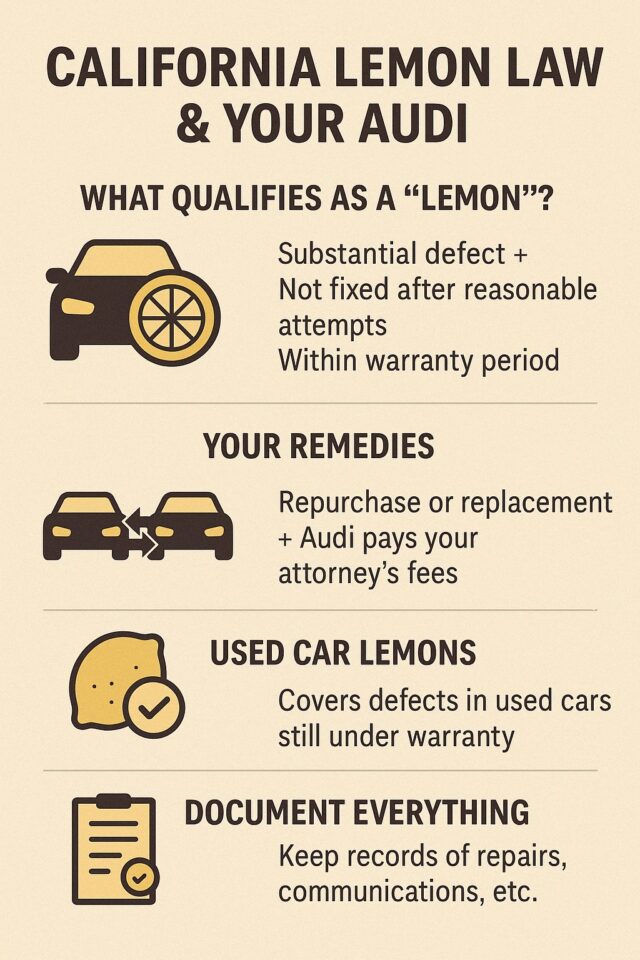
Free Case Assessment: We’ll review your situation and paperwork at no charge. We know the common Audi defects and what evidence is needed. If your car’s history meets the lemon criteria, we’ll tell you up front. If not, we’ll be honest about that too. This assessment helps you understand your chances.
Gathering Documentation: A lemon lawyer helps ensure all your repair records, correspondence, and timelines are organized. We can even obtain additional records from the dealer if needed. If you’ve missed a document, we know how to get it. We also analyze things like recall notices or technical service bulletins that strengthen your case (for instance, proving that your issue is a known defect).
Notifying the Manufacturer: In some cases, we’ll formally notify Audi of the claim and give them a last chance to fix it (often they’ve already failed multiple times, so it’s just a legal formality). Manufacturers sometimes offer a settlement at this stage.
Negotiation and Settlement: Our attorneys handle communications with Audi (Volkswagen Group) or their lawyers. We push for a fair buyback or replacement under the law. Because we’ve handled many lemon law cases, we know the tactics and we know what a fair outcome looks like. Audi might try to offer something less (like a small cash compensation or an extended warranty) – but our job is to fight for what the law entitles you to: a full refund or new car in most cases. We’re friendly but firm in negotiations to get you the best result.
Litigation (if needed): If Audi won’t do right by you, we won’t hesitate to file a lawsuit under the lemon law. Just filing suit often brings them to the table quickly. But if not, we are prepared to take the case through trial. (Most cases settle before trial.) Rest assured, you won’t pay out of pocket for this – under the law, Audi pays our attorney fees if we win, and if we don’t win you owe us nothing. Sierra Litigation provides no-fee legal services for lemon law clients, meaning we only get paid when you get your remedy. This policy makes legal help accessible to everyone, regardless of finances.
Peace of Mind: Perhaps just as important, having a lemon law lawyer in your corner means you can stop the merry-go-round of endless dealership visits. We take on the stress and communications, while you focus on getting to a resolution. Many clients say they feel a huge relief once we step in, because finally someone is listening and able to advocate effectively.
Our goal is simple: to get you back into a safe, reliable vehicle and out of your defective Audi, at no cost to you. And we aim to do it efficiently. Lemon law cases can often be resolved in a matter of a few months, sometimes sooner, through settlements. Every case varies, but we move as quickly as possible because we know you’ve been through enough with your car troubles.
Serving Audi Owners Across California
Sierra Litigation is a California lemon law firm with a statewide reach. Wherever you are in the Golden State, we’re ready to help with your Audi lemon. We have specialized teams familiar with local dealerships and Audi service centers in regions like:
Central Valley and Fresno: We’re particularly attuned to the needs of Central Valley clients. Fresno, Bakersfield, Modesto, Visalia – if you’re in the valley dealing with a problematic Audi, we understand the local dealership network and consumer landscape. Our Fresno-based lemon law lawyers have helped many clients in the valley counties. We combine local expertise with deep knowledge of California lemon law.
Southern California (Los Angeles, San Diego): In the bustling LA metro and sunny San Diego, Audi lemons are just as frustrating. Our Los Angeles lemon law attorneys have taken on cases from downtown LA to the San Fernando Valley, Orange County, and beyond. We know the dealerships and we know how to put pressure on automakers who try to drag their feet. Southern California drivers often face heavy traffic – the last thing you need is a car that stalls on the 405! We’ve got you covered.
Northern California (San Francisco Bay Area, Sacramento): Whether you’re navigating Bay Area freeways or commuting around Sacramento, you need a dependable car. Our team has handled cases in San Francisco, Oakland, San Jose, as well as the capital region. We understand the nuances of lemon law cases in Northern California and have relationships with many of the Audi dealers/service centers in the area. Wherever your Audi gave you trouble, we can step in.
In short, from the biggest cities to smaller communities, Sierra Litigation has California Audi owners covered. We pride ourselves on being accessible – we can often come to you or work with you remotely, making it convenient to get legal help.
Conclusion: Don’t Let a Lemon Audi Sour Your Ownership Experience
Owning a car like an Audi is supposed to be enjoyable – you paid for luxury and performance. If you’ve been contending with one problem after another instead, you have the right to take action. From 2022 to now, Audi vehicles have seen issues ranging from engines and transmissions to cutting-edge electronics failing. The manufacturer has issued recalls and faced lawsuits, which means your concerns are valid and recognized.
The good news is that California’s lemon law is on your side. You don’t have to keep putting up with a defective vehicle or endless dealership visits. This friendly guide has walked you through the major Audi defects and legal remedies in terms anyone can understand. If some of these problems sound familiar to what you’re experiencing, it may be time to explore your options.
What should you do now? First, stay safe – address any urgent recalls and keep records of all repair attempts. Next, consider reaching out to a dedicated Audi lemon law lawyer in California. At Sierra Litigation, we’re here to answer your questions and help determine if you have a case, free of charge. Our team knows these issues inside and out, and we’ve helped many clients get refunds or new cars when their Audi turned out to be a lemon. With our no-fee promise, you won’t pay a dime unless we win your case (and then Audi pays the fees).
Don’t let frustration with your car overwhelm you. One call or message to a knowledgeable Audi lemon law attorney can set you on the path to a resolution – and possibly a new ride that actually works as it should. So, if your Audi has been back to the shop more times than you can count for the same issues, take action. You deserve to drive a safe, reliable vehicle. Contact Sierra Litigation for a friendly, expert consultation, and let us help turn your Audi lemon into lemonade!
Disclaimer: This report is for general informational purposes and is not legal advice. Every case is unique. For specific advice on your situation, please contact a qualified lemon law attorney.
Start Your Free Audi Lemon Law Consult Today
We serve All of California:
Give Us a Call 24 hours a day:
Office Hours:
Gain Insights About the Legal Landscape For Automobile Manufacturer Lemon Law Claims in California
See What our great clients wrote about us.

Attorney John Miser and Raquel at Sierra Litigation exude professionalism, responsiveness, and are very knowledgeable. They were incredibly helpful and answered all of my questions as soon as I called. They took the time to reiterate things I did not understand and allowed me to time to process the information I was receiving. It was very refreshing to speak to a firm that cares about their clients.

I called John for a consultation- which he did over the phone - and he was the most helpful attorney I talked to all day. I had called through 15 different offices-none of which gave me more than one minute of their time, literally- before I reached Sierra Litigation. John was by far the friendliest and he didn't rush me off the phone. He provided succinct responses to help me through my issue and answered follow up questions. If I am ever in need of further representation I'm going to John. I dont care the cost - he's worth every penny compared to other offices.

My family and I are extremely grateful that we found John Miser. While calling multiple consumer fraud attorneys in the Central Valley, John Miser was the only one who responded and also responded within the hour. He has been an excellent attorney from day 1 assisting us in consumer fraud, and going above and beyond my expectations and won our case. I will definitely refer John Miser to any friends or family ever in need of his assistance. Thank you John.

John is in the middle of a battle with lowes and pergo on my behalf and I couldn't be more pleased with his tenacity, insight and strategy. Although we are early in the settlement negotiations he has already proven himself beyond all expectations. I really appreciate the fact that he is guided by principles and although this started out as a simple and relatively small warranty denial claim, he was able to uncover other violations they had done, which triggered a righteous indignation of what is likely a larger pattern of misleading consumers by lowes and pergo. Honestly in talking to john I get the sense that he gives the same attention to a $5k case as a $5 million dollar case. brilliant, honest and humble aren't strong enough words to describe John and his lawfirm. If you are dealing with a consumer protection issue or personal injury and are wondering who to call, try sierra litigation and if you are lucky enough to reach him when he is taking on new clients you will be pleased.
John has done a fantastic job with my case regarding auto fraud by a dealer. He took a case that no one wanted not for the lack of merit but because of the difficulty of it. John work tirelessly to ensure an amazing out come and took this case all the way thru arbitration to win, and get a very strong win at that! I couldn’t thank John enough for his hard work, perseverance, and willingness to take a tough case.

John is incredible. He helped me understand so much better the importance of vehicle contracts and reading them before giving a signature. He went out of his way to give me the best advice he could while being in such a terrible situation. He is very honest and went out of his way to help me even though I am not even a client! Thank you!!

So I had contacted John regarding a business related issue I was involved with, with this being my first time ever dealing with something like this, let me tell you first hand, he’s honest, upfront, very informative, and key thing, explains in detail and provides foresight. I went in to see him with my issue I had and I’ve been stressed for about a few weeks regarding my issue, I explained to him my case, afterwards I was so relieved, he provided all the different variables and approaches in my matter, it gave me a sense of guidance on what I can do and should do. I was very comfortable speaking with him, gave me a sense of relief after my meeting with him, all I can say is call him and meet with him and you will feel so much better because he really understands legal matters and understands how to help you with your case and also breaks it down for you to understand and how to go forth. Thanks John!

Hello Everyone To be honest I do not usually write reviews like this but in this case I want to share my experience with Sierra Litigation. The attorneys are John Miser and Raquel Chavez. In my opinion, both are excellent attorneys. In my case, I work mainly with Raquel Chavez. We just settled the lawsuit stemming from automobile fraud. The case took a little over two years to settle. Miss Chavez stayed on top of the case for the whole time. Any time I called to see how things were going. They were very friendly, gave me the details of how the case was going and where we go from there.They truly sounded like they were happy to hear from me. It was a pleasure working with Miss Chavez and Mr. Miser. I probably called six or eight attorneys. Most of them didn't even return my calls. The rest basically said they weren't interested in taking my case. When I called Sierra, I left a message and they called me back within five minutes. I told Mr. Miser the facts of my case and what was going on and he told me that I had a case. He was happy to help me out. I had never needed an attorney before, and I had never sued anybody before. Miss Chavez kept me informed and took the time to explain what was going on. They never rushed me off the phone and answered some of my phone was probably to them silly questions. If you're ever need an attorney, then I highly recommend both Miss Chavez and Mr. Meister. If I ever need a lawyer again and they will be the first ones I call.

